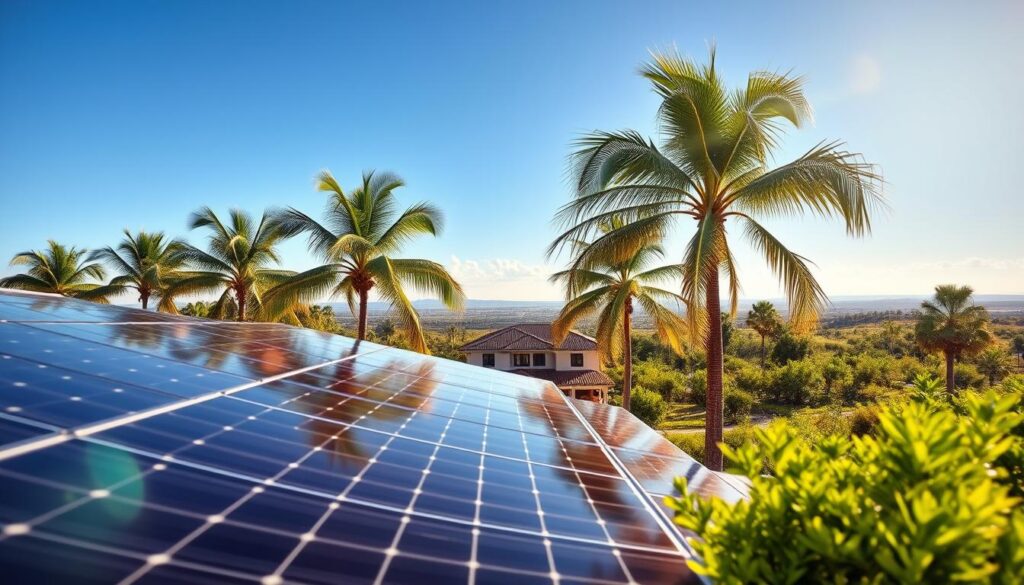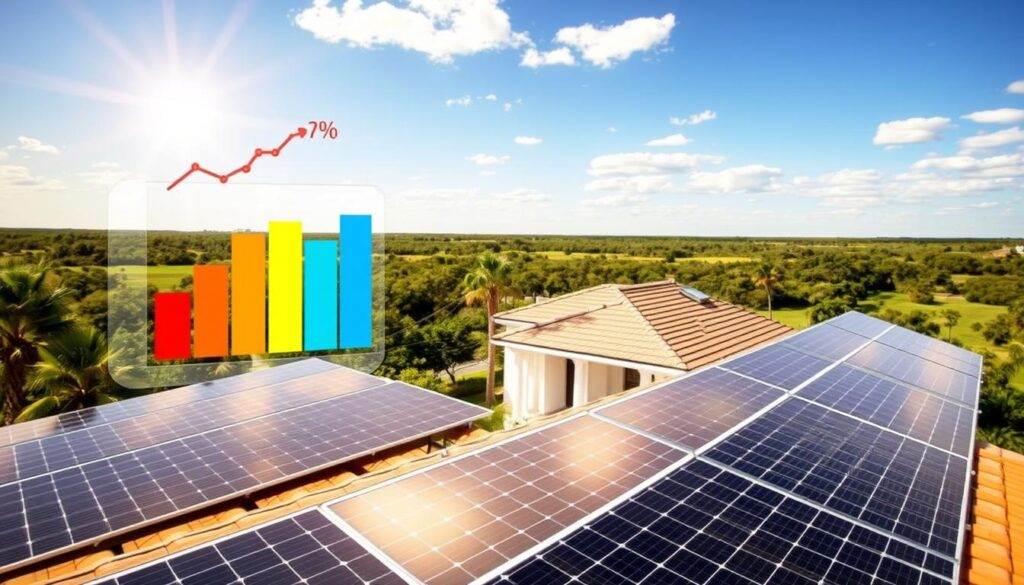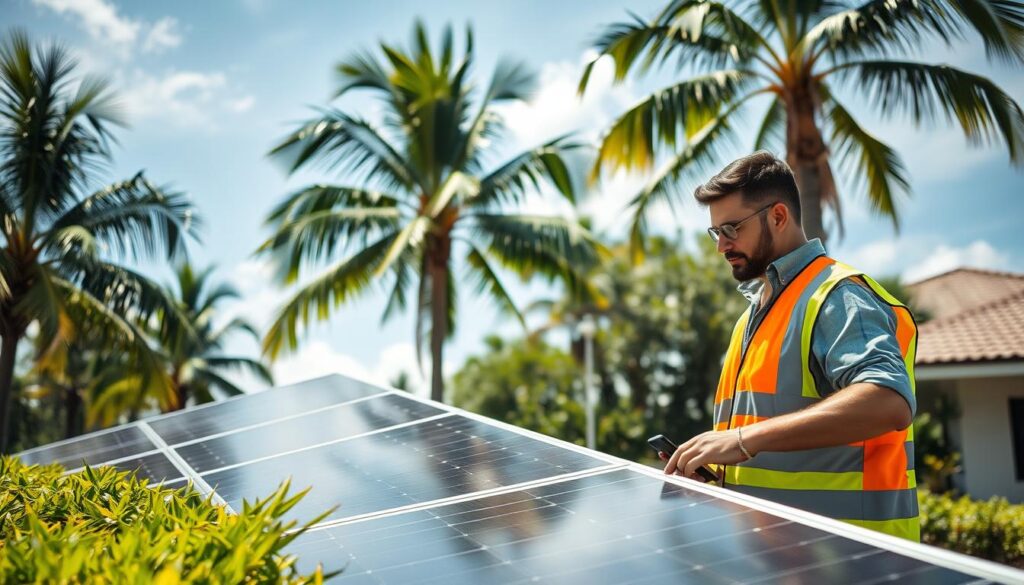Florida’s sunny climate makes it a leader in solar energy. With over 230 sunny days annually, the state generated 17,808 GWh of solar power in 2023, powering more than 2 million homes. solar panel benefits in florida are clear: homeowners cut energy bills by 30–50%, and some see savings up to 70% during peak use. This guide explores reasons to go solar in florida, from financial rewards to environmental impact.
Key Takeaways
- Florida’s solar capacity exceeds 17,055 MW, supporting widespread adoption.
- Homeowners save 30–50% on monthly energy bills with solar systems.
- A 30% federal tax credit reduces upfront costs through 2032.
- Net metering policies let users earn bill credits for excess energy.
- Solar systems add 4% average property value, per Zillow data.
Understanding Solar Energy
Solar energy benefits in Florida are growing as more residents discover how sunlight can power homes. Sustainable energy benefits in florida include lower bills and cleaner power. This renewable resource uses sunlight to create electricity, reducing reliance on traditional energy sources.
What is Solar Energy?
Solar energy is power from sunlight turned into usable electricity. In Florida, this resource is abundant, with 237 sunny days yearly. By capturing sunlight, solar systems reduce the need for grid electricity, cutting costs and emissions. This clean energy supports a greener environment while saving money.
How Solar Panels Work
Solar panels use photovoltaic cells to turn sunlight into energy. Here’s how it happens:
- Sunlight hits panels, activating silicon cells to create an electric charge.
- Direct current (DC) flows to an inverter, which converts it to alternating current (AC) for home use.
- Excess energy feeds into the grid, earning credits through net metering programs.
Florida’s strong sunlight makes systems highly efficient, maximizing solar energy benefits in florida. With proper installation, homes can slash utility bills and lower their carbon footprint.
Why Choose Solar Power in Florida?
Florida’s climate and energy needs make it a prime location for solar energy. The advantages of solar panels in florida are clear: endless sun and rising energy costs mean big savings. With over 230 sunny days yearly, the solar power benefits in florida include lower bills and long-term savings.

Abundant Sunshine Year-Round
Florida’s sunny days mean solar panels work harder. Even in winter, sunlight keeps systems efficient. Here’s why this matters:
- 3rd in solar potential nationwide, but only 14th in installations (growth opportunities!)
- 230 sunny days a year = 20% more energy than states with shorter days
Decreasing Energy Costs
High summer energy bills? Solar cuts those costs. Compare system costs and savings:
| System Size | Initial Cost | Annual Savings |
|---|---|---|
| 3kW | $7,500 | $1,000+ |
| 5kW | $13,000 | $1,500+ |
| 10kW | $25,000 | $2,000+ |
After incentives like the federal tax credit, costs drop 30-50%. A 5kW system could save $1,500 yearly—adding up to big savings over time.
Financial Incentives for Floridians
Going solar in Florida comes with more than environmental benefits—it’s also a smart financial move. From federal credits to local rebates, solar panel savings in florida add up quickly. Let’s break down how to maximize your cost savings of solar panels in florida.
Federal Solar Tax Credit
Take advantage of the federal Investment Tax Credit (ITC), which covers 30% of your system cost. For a 5kW system priced at $10,548, this credit slashes expenses by $3,164.40. Here’s how it works:
- Applies to all system sizes
- Available until 2035 under the Inflation Reduction Act
- No income limit to qualify
| Cost Breakdown | Amount |
|---|---|
| Installation Cost | $10,548 |
| Federal Tax Credit | -$3,164 |
| Net Cost After Credit | $7,384 |
| 25-Year Savings Potential | $69,799 |
State Rebates and Incentives
Florida’s programs add to your bottom line:
- Property tax exemption: Solar systems won’t raise your home’s taxable value
- Sales tax waiver: Save 6% on purchases via state sales tax exemptions
- Net metering: Four major utilities (FPL, Duke Energy, TECO, Gulf Power) offer 1:1 kWh credits for excess energy
Combine these benefits with federal credits to cut upfront costs by thousands. Don’t miss out—these incentives help turn sunshine into savings today.
Environmental Benefits of Solar Panels

Switching to solar energy unlocks sustainable energy benefits in florida while combating climate change. Florida’s sunny climate makes solar a powerful tool to reduce reliance on fossil fuels, which supply 60% of U.S. electricity. Solar panels generate power without emitting carbon, directly cutting pollution linked to rising sea levels and extreme weather.
Reducing Carbon Footprint
Every solar panel system offsets carbon emissions that harm Florida’s coastal ecosystems. A typical home using solar reduces 5-10 tons of CO2 yearly. Over 120,000 Florida homes already using solar, slashing emissions by millions of tons. Solar avoids the nitrogen oxides and sulfur dioxides from coal plants, improving air quality for residents.
Supporting Renewable Energy
Florida’s shift to solar strengthens its renewable energy mix, now at 21% nationally. The environmental benefits of solar panels in florida include cleaner air and reduced water use compared to coal plants. Solar panels are 85% recyclable, minimizing waste. According to NREL, nationwide solar adoption could save $1.7 trillion in climate damage costs by 2050.
- Florida’s solar systems prevent 200,000+ tons of CO2 yearly, per FSEIA data.
- Switching to solar supports Florida’s climate resilience goals while safeguarding wildlife habitats.
Choosing the Right Solar Panel System
Maximizing solar panel benefits in florida starts with selecting the right system. Florida’s sunny climate demands panels that balance efficiency and durability. Here’s how to pick the best option for your home.
Types of Solar Panels Available
- Monocrystalline: Efficient at 18-22%, lasting over 25 years. Ideal for smaller roofs needing high output.
- Polycrystalline: Slightly lower efficiency (15-17%) but more affordable. Best for spacious rooftops.
- Thin-film: Lightweight and flexible, but less efficient (10-13%). Great for unique roof designs.
Finding a Reputable Installer
Look for installers certified by advantages of solar panels in florida experts like NABCEP. Ask for proof of licenses and check reviews. Compare quotes from 3+ companies, and ensure warranties cover parts and labor for at least 10 years. Ask about their experience with Florida’s humidity and storms.
Choosing the right panels and a skilled installer ensures your system delivers reliable solar panel benefits in florida for decades. Start by researching options online and requesting free quotes today.
Net Metering: What You Need to Know
Net metering plays a critical role in maximizing solar panel savings in florida. This program lets homes with solar systems send unused energy to the grid and earn credits that lower electricity bills. Here’s how it works and what it means for your wallet.

Florida’s four major investor-owned utilities—FPL, Duke Energy Florida, TECO, and FPUC—manage net metering for 79% of residents. Here’s the process:
- Your system sends excess energy to the grid during sunny days.
- Your utility meter tracks both energy used and energy sent back.
- Credits appear on your bill, offsetting costs when your system produces less (like nighttime or cloudy days).
Credits roll over month-to-month at full retail value, but leftover credits at year-end earn only 3-4 cents per kWh. System size determines costs: Tier 1 (under 10kW) has no fees, while larger systems need insurance.
These policies drive real savings. With current rules, solar customers avoid paying full retail rates for grid energy they don’t use. For example, a 6kW system could cut bills by 50-75% annually. But proposed changes like SB 1024 threatened this system—93% of Floridians said they’d abandon solar plans if credits vanished.
Maximize solar power benefits in florida by timing energy use to align with peak production. Utilities like FPL also offer SolarTogether® programs for those not ready to install panels. Always review contracts carefully—NREL advises verifying terms to ensure you’re earning every possible credit.
Maintenance Requirements for Solar Panels
Regular upkeep keeps solar systems efficient, maximizing the solar energy benefits in florida. Minimal effort ensures panels work at peak performance for years.
Keeping Your Panels Clean
Florida’s climate brings unique challenges like pollen, salt spray, and debris. Clean panels twice yearly to avoid efficiency drops. According to the National Renewable Energy Laboratory, dirty panels can lose up to 20% of their output. Coastal homeowners may need extra attention due to salt buildup.
- Use soft brushes and non-abrasive cleaners
- Avoid high-pressure hoses near electrical components
- Schedule cleanings before hurricane seasons

Understanding Warranty Coverage
Most solar panels come with 25+ year warranties. Review terms to ensure maintenance practices don’t void coverage. Key components and their guarantees:
| Component | Warranty Period | Details |
|---|---|---|
| Solar Panels | 20–25 years | Guarantees 80%+ output after 25 years |
| Inverters | 10–15 years | Typically replaced every 12 years at $1,000–$2,000 |
Annual inspections ($150–$300) catch issues early. Proper maintenance unlocks long-term solar panel benefits in florida, extending system life and savings.
The Impact of Solar Power on Property Value
Investing in solar panels isn’t just about saving on bills—it can boost your home’s worth. Florida’s booming real estate market rewards homes with advantages of solar panels in florida, making them more attractive and valuable. Let’s explore how solar transforms real estate investments.
Boost Property Value with Solar
Data shows homes with solar sell faster and for more money. In Florida, solar-equipped homes sell for 4.1% higher than non-solar homes. For a $300,000 home, this equals over $12,000 extra. A 5-kW system in Jacksonville could add up to $18,000 in value.
| City | Average Home Price | Solar Value Increase |
|---|---|---|
| St. Augustine | $460,374 | +$15,000+ |
| Jacksonville | $303,097 | $3.78 per watt |
| Middleburg | $337,442 | +$17,628 |
Appeal to Eco-Conscious Buyers
Florida’s influx of 500,000+ new residents since 2021 drives demand for eco-friendly homes. 80% of buyers seek energy-efficient upgrades. Solar panels signal long-term savings, making homes stand out in competitive markets. In Orlando, solar homes command a 4.6% premium, outperforming state averages.
Studies from the National Renewable Energy Laboratory show every $1 in energy savings adds $20 to home value. Florida’s property tax exemption for solar systems ensures no tax penalties, making installations a reasons to go solar in florida even clearer.
When selling, highlight solar benefits with performance reports and warranty details. Buyers pay up to $9,274 extra for solar-equipped homes. Florida’s sunny climate and strong demand make solar a win for both current savings and future resale potential.
Community Solar Programs in Florida
Florida’s community solar programs open doors to solar energy benefits in florida for everyone, from renters to homeowners. These shared projects let participants subscribe to a local solar farm and enjoy clean energy without rooftop installations. Let’s explore how these programs work and their perks.
What Are Community Solar Programs?
These programs pool investments in solar farms. Subscribers choose how much energy to buy, like FPL’s SolarTogether, which offers 1kW increments. For example, a 7kW subscription costs $47.32/month and generates 1,260 kWh monthly. Participants earn bill credits based on energy produced.
Benefits of Joining a Local Program
- No upfront costs or long-term contracts required
- Available to renters, homeowners, and those with HOA restrictions
- Bill credits rise yearly, surpassing subscription fees by year four
- Environmental impact equals planting over 100 trees annually
| Program | Subscription Rate | Environmental Impact | Eligibility |
|---|---|---|---|
| FPL SolarTogether | $6.76/kW | 100+ trees/year | All residents |
| Duke Energy Clean Energy Connection | $8.35/kW | 26 MW reserved for low-income households | Low-income households on subsidy programs |
Community solar programs also offer transferable subscriptions if you move within the service area. With sustainable energy benefits in florida, these initiatives make clean energy accessible while cutting costs. Explore options like FPL or Duke Energy’s programs to join today!
Solar Technology Innovations
Solar power benefits in florida continue to grow as cutting-edge technology reshapes how homes harness energy. From smarter panels to storage solutions, these advancements make sustainable energy benefits in florida more accessible than ever.
Advances in Solar Panel Efficiency
New innovations boost energy capture even in limited spaces. Bifacial panels now collect sunlight from both sides, increasing output by up to 15%. Thin-film solar cells work well in Florida’s humid climate and low-light conditions, reducing reliance on traditional grids.
Battery Storage Solutions
- Tesla Powerwall systems store excess energy, ensuring power during outages or evening use.
- Modern batteries last 10+ years, aligning with Florida’s hurricane season resilience needs.
- Anti-solar panels now generate 25% capacity at night, extending energy availability.
| Technology | Efficiency Boost | Key Use Case |
|---|---|---|
| Bifacial Panels | 15% higher output | Urban rooftops and ground mounts |
| Thin-Film Cells | 20% less space needed | Commercial buildings and farms |
| Floating Solar Farms | 15% efficiency gain | Lakes and reservoirs in Florida |
Florida’s waterways are ideal for floating solar farms, which boost production while cooling panels. These innovations lower costs and enhance reliability, making solar a smart choice for homes and businesses. Explore these upgrades to maximize savings and sustainability today!
Overcoming Common Misconceptions
Myths about solar energy can stop homeowners from exploring solar panel savings in florida. Let’s address two big concerns head-on with facts.
Solar Panels Are Expensive
Upfront costs matter, but reasons to go solar in florida include long-term gains. Here’s how it breaks down:
- Cost Drop: Prices fell 70% in 10 years
- Incentives: Federal tax credit covers 30% of installation
- ROI: Payback in 6–8 years vs. 25–30 year lifespan
| Year | Upfront Cost | Annual Savings | Total Savings by Year 10 |
|---|---|---|---|
| 2024 | $15,000 | $1,200 | $12,000 |
| 2034 | — | $1,500 | $24,000 |
Solar Power Isn’t Reliable
Florida’s weather isn’t gentle, but modern systems handle it. Key facts:
- Stormproof: Panels withstand 120mph winds (tested to Miami-Dade standards)
- Battery Backup: Tesla Powerwall and LG Chem systems store energy for cloudy days
- Uptime: 95%+ efficiency even during Florida’s 230 sunny days/year
“Our system cut bills by 85% and survived Hurricane Ian intact.” – Maria R., Tampa homeowner
With reasons to go solar in florida backed by real data, it’s clear these concerns don’t hold up under scrutiny.
Taking the Next Steps Toward Solar Energy
Ready to make your home more sustainable and cut energy bills? Florida’s sunny climate and strong incentives make solar an ideal choice. Start by learning how to secure the best system for your needs.
Getting a Free Solar Estimate
Begin with a free assessment from certified installers. Provide details like past electricity bills and roof conditions. Top installers like SunPower or Tesla Energy will evaluate your property’s potential. Compare quotes by checking warranties, system efficiency, and customer reviews. Ask about performance guarantees and maintenance plans to ensure reliability.
Understanding Your Financing Options
Many programs help reduce upfront costs. The federal tax credit currently offers 30% off installation, saving $9,000 on a $30,000 system. Florida’s sales tax exemption lowers costs further. Explore loans with low interest rates, leases, or PPAs. Leases let you pay monthly fees instead of buying outright, while loans let you own the system outright.
With the cost savings of solar panels in florida, most systems pay for themselves in 6–10 years. Over 25 years, panels deliver steady returns. Don’t forget Florida’s net metering programs, which credit excess energy sent to the grid. Start by requesting estimates from installers like Sunrun or Vivint Solar to compare options.
Whether you’re aiming to slash bills or boost property value, solar energy offers a smart investment. Use state and federal incentives to simplify the transition. Visit EnergySage or the DSIRE database to explore local rebates and financing. The solar panel benefits in florida are clear—start your journey today.
